MSc Information Systems: Ethical Dilemmas in OD Project Proposal
VerifiedAdded on 2022/12/15
|32
|5563
|327
Project
AI Summary
This project proposal for MSc Information Systems Management explores ethical dilemmas within organizational development (OD). It begins with an abstract highlighting the importance of business ethics in preventing ethical issues. The proposal includes a detailed background on OD, research questions focusing on how ethical behavior and managerial decision-making influence organizational development, and a comprehensive literature review. The literature review examines ethics in organizations, ethical dilemmas in OD, and various types of dilemmas, including technical ineptness and ambiguity in stakeholder needs. The methodology section discusses qualitative and quantitative approaches, with an emphasis on interviews and surveys. The proposal also includes a project plan, consideration of ethical issues, and relevant appendices. The study aims to investigate the causes and impacts of ethical dilemmas and provide insights into their mitigation.
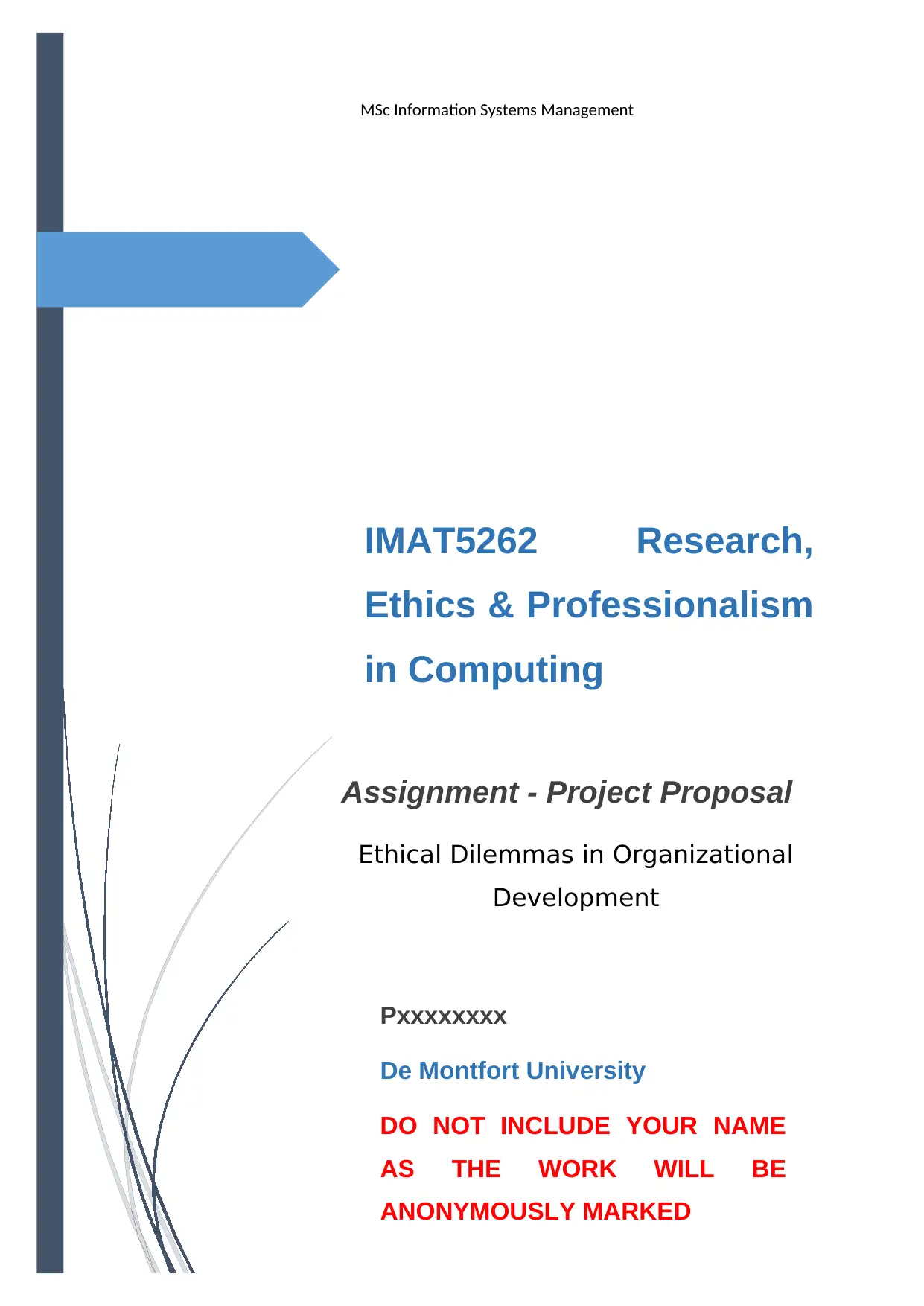
MSc Information Systems Management
IMAT5262 Research,
Ethics & Professionalism
in Computing
Assignment - Project Proposal
Ethical Dilemmas in Organizational
Development
Pxxxxxxxx
De Montfort University
DO NOT INCLUDE YOUR NAME
AS THE WORK WILL BE
ANONYMOUSLY MARKED
IMAT5262 Research,
Ethics & Professionalism
in Computing
Assignment - Project Proposal
Ethical Dilemmas in Organizational
Development
Pxxxxxxxx
De Montfort University
DO NOT INCLUDE YOUR NAME
AS THE WORK WILL BE
ANONYMOUSLY MARKED
Paraphrase This Document
Need a fresh take? Get an instant paraphrase of this document with our AI Paraphraser
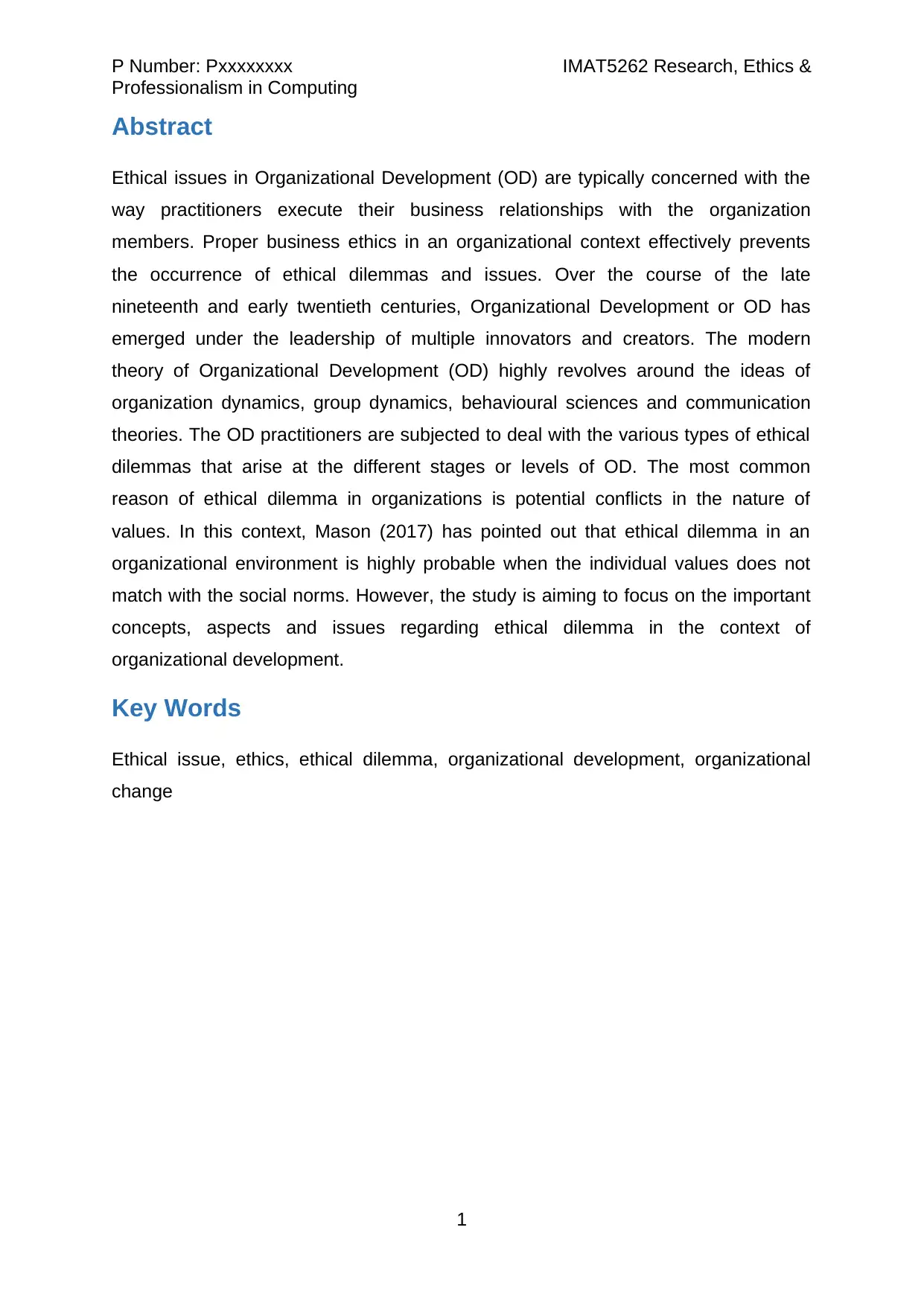
P Number: Pxxxxxxxx IMAT5262 Research, Ethics &
Professionalism in Computing
Abstract
Ethical issues in Organizational Development (OD) are typically concerned with the
way practitioners execute their business relationships with the organization
members. Proper business ethics in an organizational context effectively prevents
the occurrence of ethical dilemmas and issues. Over the course of the late
nineteenth and early twentieth centuries, Organizational Development or OD has
emerged under the leadership of multiple innovators and creators. The modern
theory of Organizational Development (OD) highly revolves around the ideas of
organization dynamics, group dynamics, behavioural sciences and communication
theories. The OD practitioners are subjected to deal with the various types of ethical
dilemmas that arise at the different stages or levels of OD. The most common
reason of ethical dilemma in organizations is potential conflicts in the nature of
values. In this context, Mason (2017) has pointed out that ethical dilemma in an
organizational environment is highly probable when the individual values does not
match with the social norms. However, the study is aiming to focus on the important
concepts, aspects and issues regarding ethical dilemma in the context of
organizational development.
Key Words
Ethical issue, ethics, ethical dilemma, organizational development, organizational
change
1
Professionalism in Computing
Abstract
Ethical issues in Organizational Development (OD) are typically concerned with the
way practitioners execute their business relationships with the organization
members. Proper business ethics in an organizational context effectively prevents
the occurrence of ethical dilemmas and issues. Over the course of the late
nineteenth and early twentieth centuries, Organizational Development or OD has
emerged under the leadership of multiple innovators and creators. The modern
theory of Organizational Development (OD) highly revolves around the ideas of
organization dynamics, group dynamics, behavioural sciences and communication
theories. The OD practitioners are subjected to deal with the various types of ethical
dilemmas that arise at the different stages or levels of OD. The most common
reason of ethical dilemma in organizations is potential conflicts in the nature of
values. In this context, Mason (2017) has pointed out that ethical dilemma in an
organizational environment is highly probable when the individual values does not
match with the social norms. However, the study is aiming to focus on the important
concepts, aspects and issues regarding ethical dilemma in the context of
organizational development.
Key Words
Ethical issue, ethics, ethical dilemma, organizational development, organizational
change
1
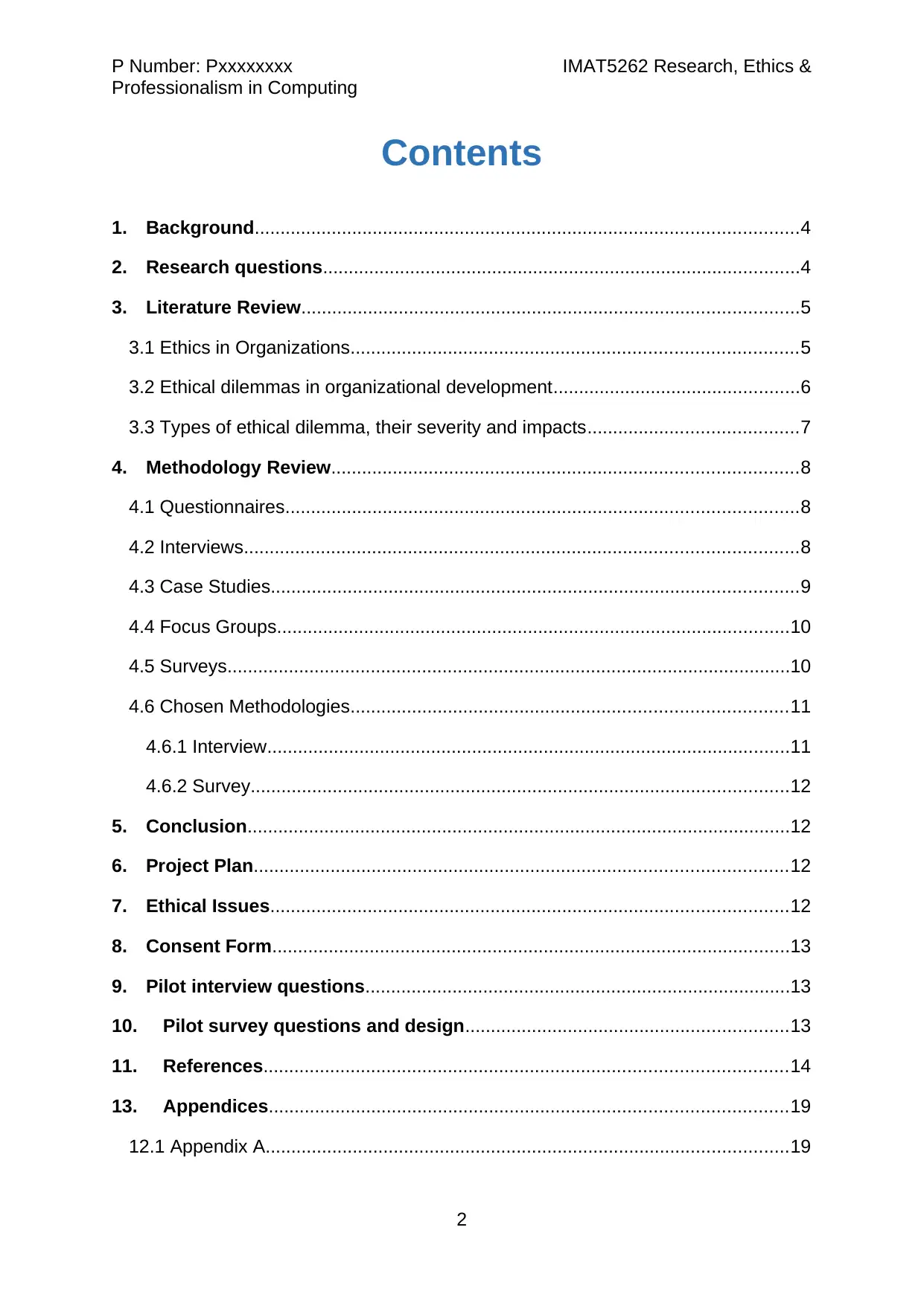
P Number: Pxxxxxxxx IMAT5262 Research, Ethics &
Professionalism in Computing
Contents
1. Background..........................................................................................................4
2. Research questions.............................................................................................4
3. Literature Review.................................................................................................5
3.1 Ethics in Organizations.......................................................................................5
3.2 Ethical dilemmas in organizational development................................................6
3.3 Types of ethical dilemma, their severity and impacts.........................................7
4. Methodology Review...........................................................................................8
4.1 Questionnaires....................................................................................................8
4.2 Interviews............................................................................................................8
4.3 Case Studies.......................................................................................................9
4.4 Focus Groups....................................................................................................10
4.5 Surveys..............................................................................................................10
4.6 Chosen Methodologies.....................................................................................11
4.6.1 Interview......................................................................................................11
4.6.2 Survey.........................................................................................................12
5. Conclusion..........................................................................................................12
6. Project Plan........................................................................................................12
7. Ethical Issues.....................................................................................................12
8. Consent Form.....................................................................................................13
9. Pilot interview questions...................................................................................13
10. Pilot survey questions and design...............................................................13
11. References......................................................................................................14
13. Appendices.....................................................................................................19
12.1 Appendix A......................................................................................................19
2
Professionalism in Computing
Contents
1. Background..........................................................................................................4
2. Research questions.............................................................................................4
3. Literature Review.................................................................................................5
3.1 Ethics in Organizations.......................................................................................5
3.2 Ethical dilemmas in organizational development................................................6
3.3 Types of ethical dilemma, their severity and impacts.........................................7
4. Methodology Review...........................................................................................8
4.1 Questionnaires....................................................................................................8
4.2 Interviews............................................................................................................8
4.3 Case Studies.......................................................................................................9
4.4 Focus Groups....................................................................................................10
4.5 Surveys..............................................................................................................10
4.6 Chosen Methodologies.....................................................................................11
4.6.1 Interview......................................................................................................11
4.6.2 Survey.........................................................................................................12
5. Conclusion..........................................................................................................12
6. Project Plan........................................................................................................12
7. Ethical Issues.....................................................................................................12
8. Consent Form.....................................................................................................13
9. Pilot interview questions...................................................................................13
10. Pilot survey questions and design...............................................................13
11. References......................................................................................................14
13. Appendices.....................................................................................................19
12.1 Appendix A......................................................................................................19
2
⊘ This is a preview!⊘
Do you want full access?
Subscribe today to unlock all pages.

Trusted by 1+ million students worldwide

P Number: Pxxxxxxxx IMAT5262 Research, Ethics &
Professionalism in Computing
12.2 Appendix B........................................................................................................0
......................................................................................................................................4
......................................................................................................................................5
10. Consent Form.......................................................................................................5
12.3 Appendix C........................................................................................................6
12.4 Appendix D........................................................................................................8
12.5 Appendix E........................................................................................................9
3
Professionalism in Computing
12.2 Appendix B........................................................................................................0
......................................................................................................................................4
......................................................................................................................................5
10. Consent Form.......................................................................................................5
12.3 Appendix C........................................................................................................6
12.4 Appendix D........................................................................................................8
12.5 Appendix E........................................................................................................9
3
Paraphrase This Document
Need a fresh take? Get an instant paraphrase of this document with our AI Paraphraser
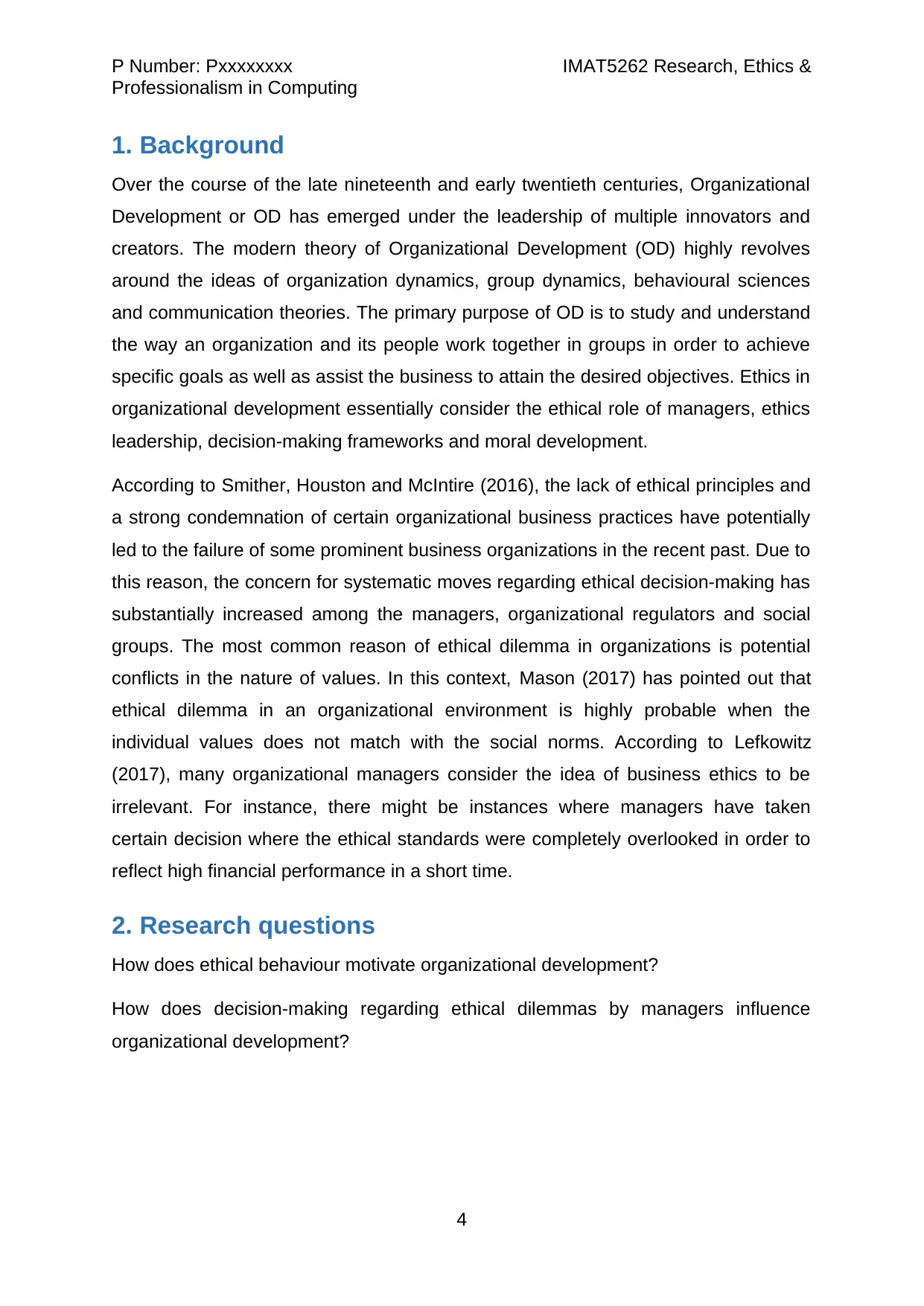
P Number: Pxxxxxxxx IMAT5262 Research, Ethics &
Professionalism in Computing
1. Background
Over the course of the late nineteenth and early twentieth centuries, Organizational
Development or OD has emerged under the leadership of multiple innovators and
creators. The modern theory of Organizational Development (OD) highly revolves
around the ideas of organization dynamics, group dynamics, behavioural sciences
and communication theories. The primary purpose of OD is to study and understand
the way an organization and its people work together in groups in order to achieve
specific goals as well as assist the business to attain the desired objectives. Ethics in
organizational development essentially consider the ethical role of managers, ethics
leadership, decision-making frameworks and moral development.
According to Smither, Houston and McIntire (2016), the lack of ethical principles and
a strong condemnation of certain organizational business practices have potentially
led to the failure of some prominent business organizations in the recent past. Due to
this reason, the concern for systematic moves regarding ethical decision-making has
substantially increased among the managers, organizational regulators and social
groups. The most common reason of ethical dilemma in organizations is potential
conflicts in the nature of values. In this context, Mason (2017) has pointed out that
ethical dilemma in an organizational environment is highly probable when the
individual values does not match with the social norms. According to Lefkowitz
(2017), many organizational managers consider the idea of business ethics to be
irrelevant. For instance, there might be instances where managers have taken
certain decision where the ethical standards were completely overlooked in order to
reflect high financial performance in a short time.
2. Research questions
How does ethical behaviour motivate organizational development?
How does decision-making regarding ethical dilemmas by managers influence
organizational development?
4
Professionalism in Computing
1. Background
Over the course of the late nineteenth and early twentieth centuries, Organizational
Development or OD has emerged under the leadership of multiple innovators and
creators. The modern theory of Organizational Development (OD) highly revolves
around the ideas of organization dynamics, group dynamics, behavioural sciences
and communication theories. The primary purpose of OD is to study and understand
the way an organization and its people work together in groups in order to achieve
specific goals as well as assist the business to attain the desired objectives. Ethics in
organizational development essentially consider the ethical role of managers, ethics
leadership, decision-making frameworks and moral development.
According to Smither, Houston and McIntire (2016), the lack of ethical principles and
a strong condemnation of certain organizational business practices have potentially
led to the failure of some prominent business organizations in the recent past. Due to
this reason, the concern for systematic moves regarding ethical decision-making has
substantially increased among the managers, organizational regulators and social
groups. The most common reason of ethical dilemma in organizations is potential
conflicts in the nature of values. In this context, Mason (2017) has pointed out that
ethical dilemma in an organizational environment is highly probable when the
individual values does not match with the social norms. According to Lefkowitz
(2017), many organizational managers consider the idea of business ethics to be
irrelevant. For instance, there might be instances where managers have taken
certain decision where the ethical standards were completely overlooked in order to
reflect high financial performance in a short time.
2. Research questions
How does ethical behaviour motivate organizational development?
How does decision-making regarding ethical dilemmas by managers influence
organizational development?
4
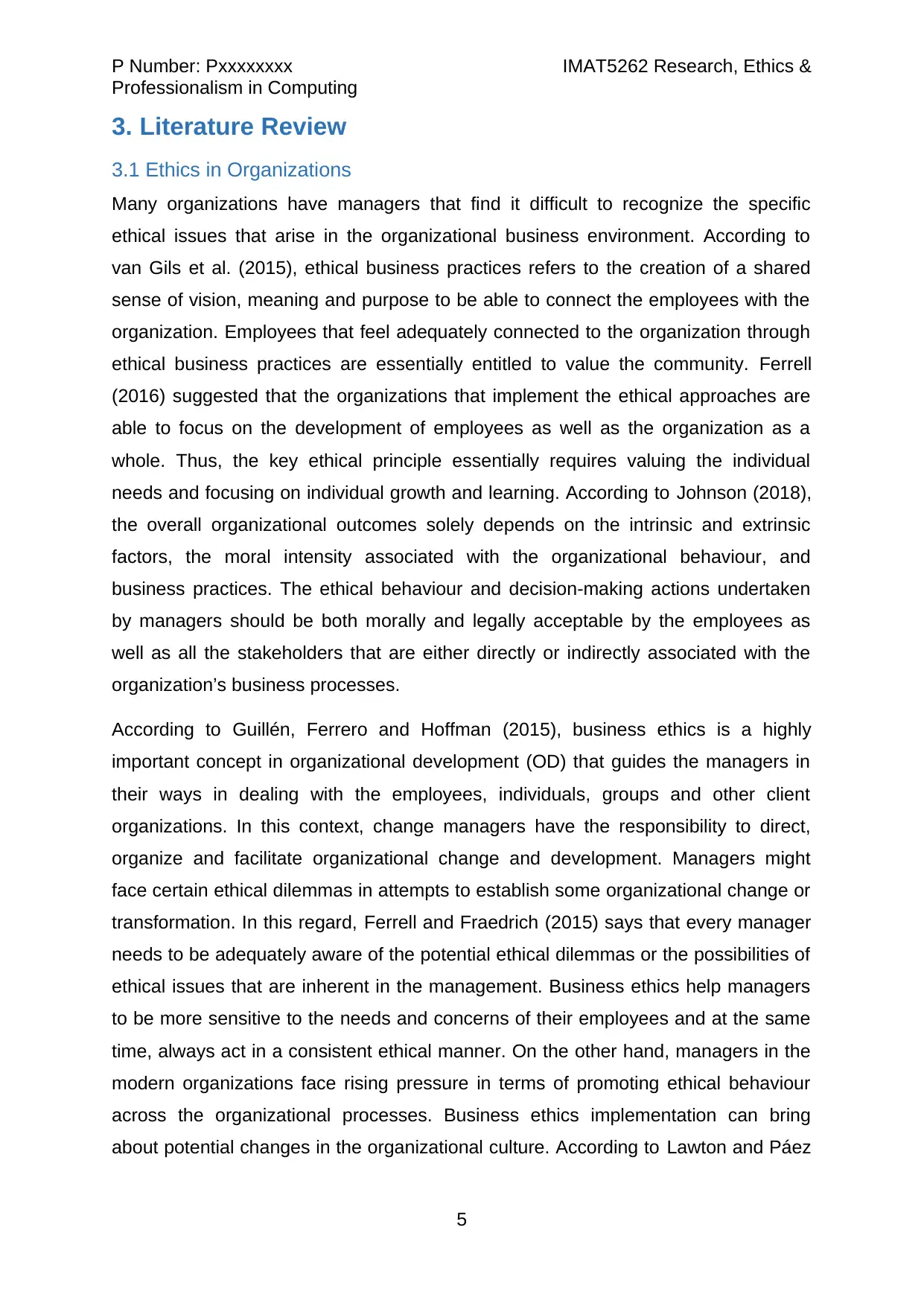
P Number: Pxxxxxxxx IMAT5262 Research, Ethics &
Professionalism in Computing
3. Literature Review
3.1 Ethics in Organizations
Many organizations have managers that find it difficult to recognize the specific
ethical issues that arise in the organizational business environment. According to
van Gils et al. (2015), ethical business practices refers to the creation of a shared
sense of vision, meaning and purpose to be able to connect the employees with the
organization. Employees that feel adequately connected to the organization through
ethical business practices are essentially entitled to value the community. Ferrell
(2016) suggested that the organizations that implement the ethical approaches are
able to focus on the development of employees as well as the organization as a
whole. Thus, the key ethical principle essentially requires valuing the individual
needs and focusing on individual growth and learning. According to Johnson (2018),
the overall organizational outcomes solely depends on the intrinsic and extrinsic
factors, the moral intensity associated with the organizational behaviour, and
business practices. The ethical behaviour and decision-making actions undertaken
by managers should be both morally and legally acceptable by the employees as
well as all the stakeholders that are either directly or indirectly associated with the
organization’s business processes.
According to Guillén, Ferrero and Hoffman (2015), business ethics is a highly
important concept in organizational development (OD) that guides the managers in
their ways in dealing with the employees, individuals, groups and other client
organizations. In this context, change managers have the responsibility to direct,
organize and facilitate organizational change and development. Managers might
face certain ethical dilemmas in attempts to establish some organizational change or
transformation. In this regard, Ferrell and Fraedrich (2015) says that every manager
needs to be adequately aware of the potential ethical dilemmas or the possibilities of
ethical issues that are inherent in the management. Business ethics help managers
to be more sensitive to the needs and concerns of their employees and at the same
time, always act in a consistent ethical manner. On the other hand, managers in the
modern organizations face rising pressure in terms of promoting ethical behaviour
across the organizational processes. Business ethics implementation can bring
about potential changes in the organizational culture. According to Lawton and Páez
5
Professionalism in Computing
3. Literature Review
3.1 Ethics in Organizations
Many organizations have managers that find it difficult to recognize the specific
ethical issues that arise in the organizational business environment. According to
van Gils et al. (2015), ethical business practices refers to the creation of a shared
sense of vision, meaning and purpose to be able to connect the employees with the
organization. Employees that feel adequately connected to the organization through
ethical business practices are essentially entitled to value the community. Ferrell
(2016) suggested that the organizations that implement the ethical approaches are
able to focus on the development of employees as well as the organization as a
whole. Thus, the key ethical principle essentially requires valuing the individual
needs and focusing on individual growth and learning. According to Johnson (2018),
the overall organizational outcomes solely depends on the intrinsic and extrinsic
factors, the moral intensity associated with the organizational behaviour, and
business practices. The ethical behaviour and decision-making actions undertaken
by managers should be both morally and legally acceptable by the employees as
well as all the stakeholders that are either directly or indirectly associated with the
organization’s business processes.
According to Guillén, Ferrero and Hoffman (2015), business ethics is a highly
important concept in organizational development (OD) that guides the managers in
their ways in dealing with the employees, individuals, groups and other client
organizations. In this context, change managers have the responsibility to direct,
organize and facilitate organizational change and development. Managers might
face certain ethical dilemmas in attempts to establish some organizational change or
transformation. In this regard, Ferrell and Fraedrich (2015) says that every manager
needs to be adequately aware of the potential ethical dilemmas or the possibilities of
ethical issues that are inherent in the management. Business ethics help managers
to be more sensitive to the needs and concerns of their employees and at the same
time, always act in a consistent ethical manner. On the other hand, managers in the
modern organizations face rising pressure in terms of promoting ethical behaviour
across the organizational processes. Business ethics implementation can bring
about potential changes in the organizational culture. According to Lawton and Páez
5
⊘ This is a preview!⊘
Do you want full access?
Subscribe today to unlock all pages.

Trusted by 1+ million students worldwide
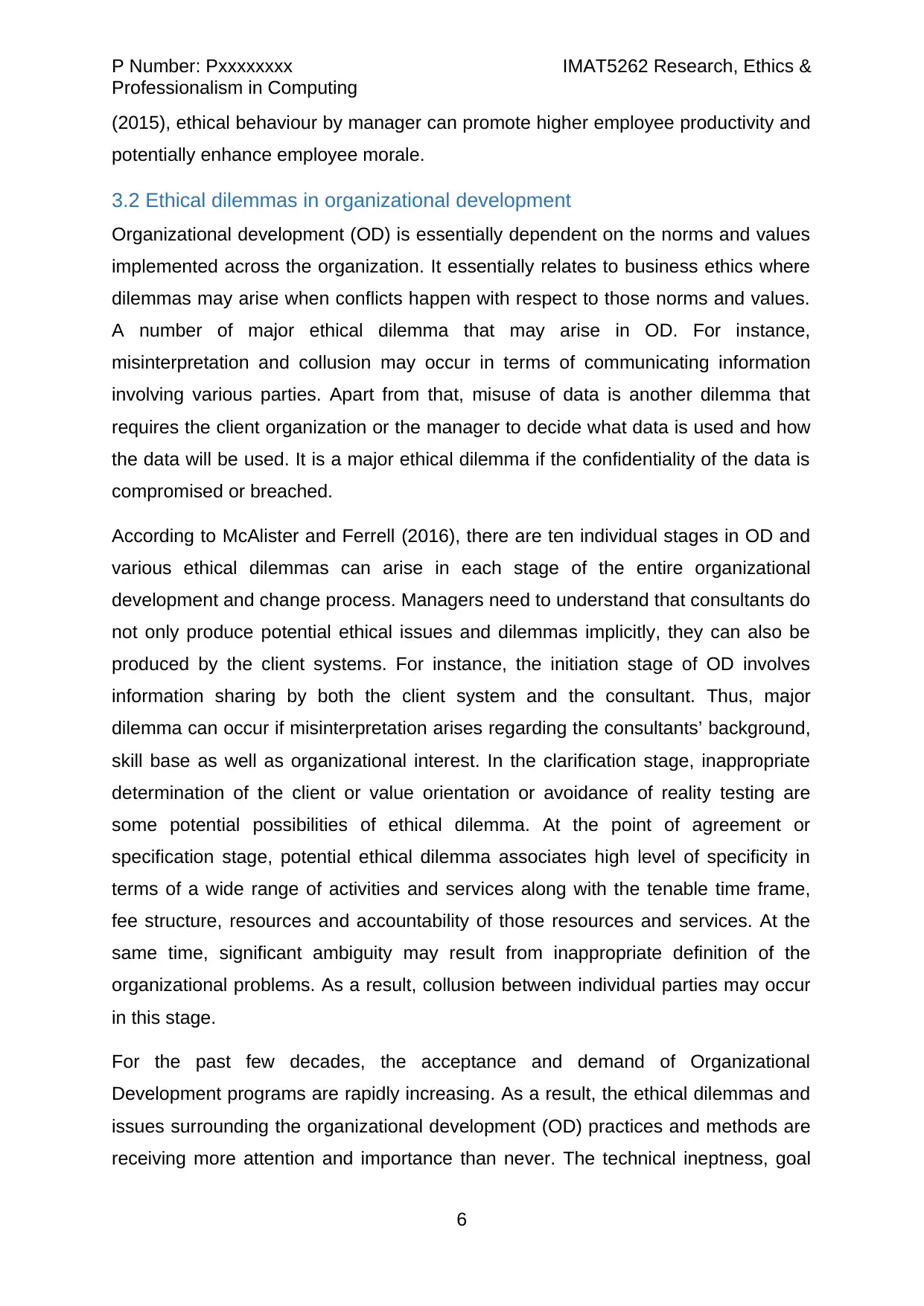
P Number: Pxxxxxxxx IMAT5262 Research, Ethics &
Professionalism in Computing
(2015), ethical behaviour by manager can promote higher employee productivity and
potentially enhance employee morale.
3.2 Ethical dilemmas in organizational development
Organizational development (OD) is essentially dependent on the norms and values
implemented across the organization. It essentially relates to business ethics where
dilemmas may arise when conflicts happen with respect to those norms and values.
A number of major ethical dilemma that may arise in OD. For instance,
misinterpretation and collusion may occur in terms of communicating information
involving various parties. Apart from that, misuse of data is another dilemma that
requires the client organization or the manager to decide what data is used and how
the data will be used. It is a major ethical dilemma if the confidentiality of the data is
compromised or breached.
According to McAlister and Ferrell (2016), there are ten individual stages in OD and
various ethical dilemmas can arise in each stage of the entire organizational
development and change process. Managers need to understand that consultants do
not only produce potential ethical issues and dilemmas implicitly, they can also be
produced by the client systems. For instance, the initiation stage of OD involves
information sharing by both the client system and the consultant. Thus, major
dilemma can occur if misinterpretation arises regarding the consultants’ background,
skill base as well as organizational interest. In the clarification stage, inappropriate
determination of the client or value orientation or avoidance of reality testing are
some potential possibilities of ethical dilemma. At the point of agreement or
specification stage, potential ethical dilemma associates high level of specificity in
terms of a wide range of activities and services along with the tenable time frame,
fee structure, resources and accountability of those resources and services. At the
same time, significant ambiguity may result from inappropriate definition of the
organizational problems. As a result, collusion between individual parties may occur
in this stage.
For the past few decades, the acceptance and demand of Organizational
Development programs are rapidly increasing. As a result, the ethical dilemmas and
issues surrounding the organizational development (OD) practices and methods are
receiving more attention and importance than never. The technical ineptness, goal
6
Professionalism in Computing
(2015), ethical behaviour by manager can promote higher employee productivity and
potentially enhance employee morale.
3.2 Ethical dilemmas in organizational development
Organizational development (OD) is essentially dependent on the norms and values
implemented across the organization. It essentially relates to business ethics where
dilemmas may arise when conflicts happen with respect to those norms and values.
A number of major ethical dilemma that may arise in OD. For instance,
misinterpretation and collusion may occur in terms of communicating information
involving various parties. Apart from that, misuse of data is another dilemma that
requires the client organization or the manager to decide what data is used and how
the data will be used. It is a major ethical dilemma if the confidentiality of the data is
compromised or breached.
According to McAlister and Ferrell (2016), there are ten individual stages in OD and
various ethical dilemmas can arise in each stage of the entire organizational
development and change process. Managers need to understand that consultants do
not only produce potential ethical issues and dilemmas implicitly, they can also be
produced by the client systems. For instance, the initiation stage of OD involves
information sharing by both the client system and the consultant. Thus, major
dilemma can occur if misinterpretation arises regarding the consultants’ background,
skill base as well as organizational interest. In the clarification stage, inappropriate
determination of the client or value orientation or avoidance of reality testing are
some potential possibilities of ethical dilemma. At the point of agreement or
specification stage, potential ethical dilemma associates high level of specificity in
terms of a wide range of activities and services along with the tenable time frame,
fee structure, resources and accountability of those resources and services. At the
same time, significant ambiguity may result from inappropriate definition of the
organizational problems. As a result, collusion between individual parties may occur
in this stage.
For the past few decades, the acceptance and demand of Organizational
Development programs are rapidly increasing. As a result, the ethical dilemmas and
issues surrounding the organizational development (OD) practices and methods are
receiving more attention and importance than never. The technical ineptness, goal
6
Paraphrase This Document
Need a fresh take? Get an instant paraphrase of this document with our AI Paraphraser
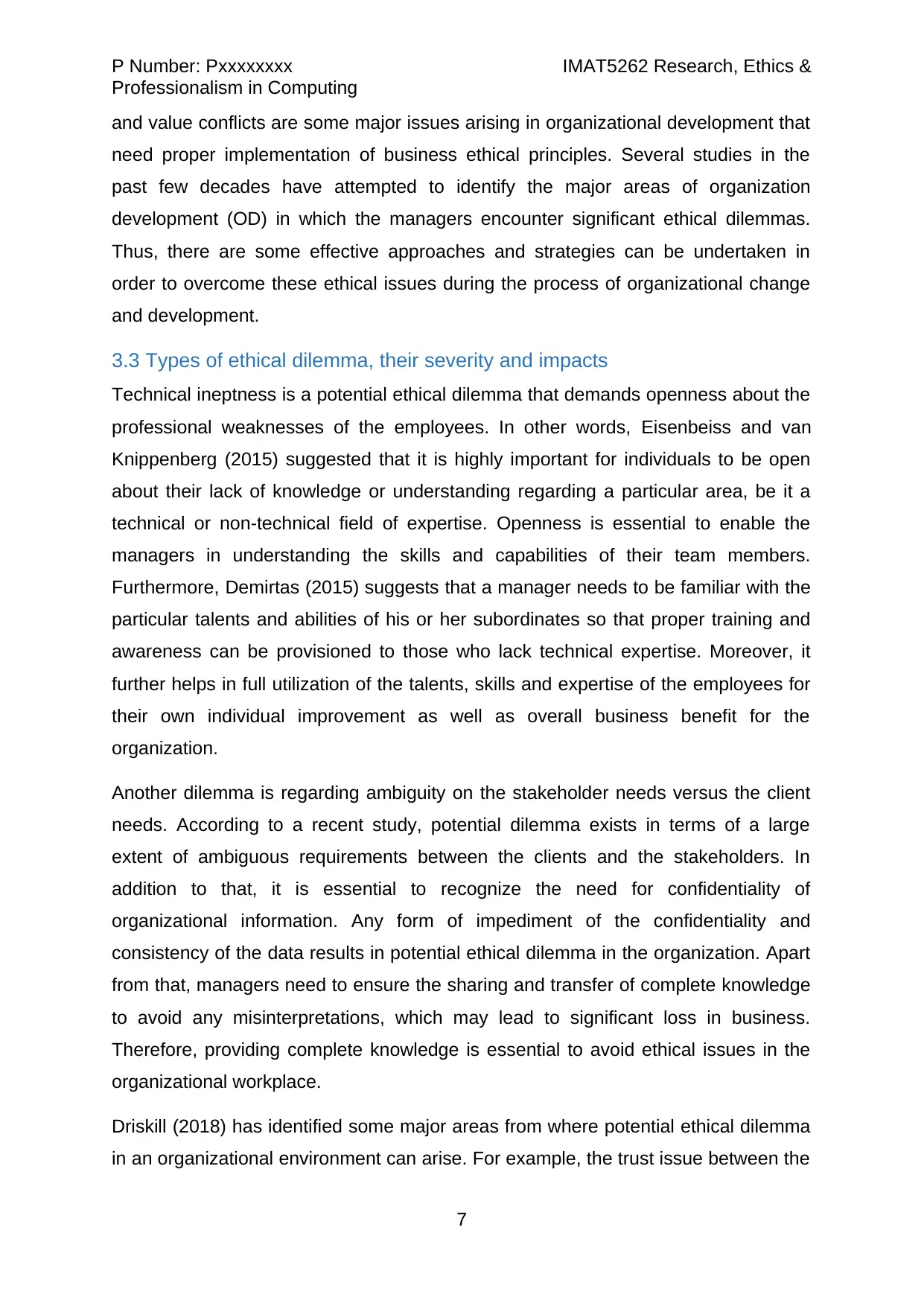
P Number: Pxxxxxxxx IMAT5262 Research, Ethics &
Professionalism in Computing
and value conflicts are some major issues arising in organizational development that
need proper implementation of business ethical principles. Several studies in the
past few decades have attempted to identify the major areas of organization
development (OD) in which the managers encounter significant ethical dilemmas.
Thus, there are some effective approaches and strategies can be undertaken in
order to overcome these ethical issues during the process of organizational change
and development.
3.3 Types of ethical dilemma, their severity and impacts
Technical ineptness is a potential ethical dilemma that demands openness about the
professional weaknesses of the employees. In other words, Eisenbeiss and van
Knippenberg (2015) suggested that it is highly important for individuals to be open
about their lack of knowledge or understanding regarding a particular area, be it a
technical or non-technical field of expertise. Openness is essential to enable the
managers in understanding the skills and capabilities of their team members.
Furthermore, Demirtas (2015) suggests that a manager needs to be familiar with the
particular talents and abilities of his or her subordinates so that proper training and
awareness can be provisioned to those who lack technical expertise. Moreover, it
further helps in full utilization of the talents, skills and expertise of the employees for
their own individual improvement as well as overall business benefit for the
organization.
Another dilemma is regarding ambiguity on the stakeholder needs versus the client
needs. According to a recent study, potential dilemma exists in terms of a large
extent of ambiguous requirements between the clients and the stakeholders. In
addition to that, it is essential to recognize the need for confidentiality of
organizational information. Any form of impediment of the confidentiality and
consistency of the data results in potential ethical dilemma in the organization. Apart
from that, managers need to ensure the sharing and transfer of complete knowledge
to avoid any misinterpretations, which may lead to significant loss in business.
Therefore, providing complete knowledge is essential to avoid ethical issues in the
organizational workplace.
Driskill (2018) has identified some major areas from where potential ethical dilemma
in an organizational environment can arise. For example, the trust issue between the
7
Professionalism in Computing
and value conflicts are some major issues arising in organizational development that
need proper implementation of business ethical principles. Several studies in the
past few decades have attempted to identify the major areas of organization
development (OD) in which the managers encounter significant ethical dilemmas.
Thus, there are some effective approaches and strategies can be undertaken in
order to overcome these ethical issues during the process of organizational change
and development.
3.3 Types of ethical dilemma, their severity and impacts
Technical ineptness is a potential ethical dilemma that demands openness about the
professional weaknesses of the employees. In other words, Eisenbeiss and van
Knippenberg (2015) suggested that it is highly important for individuals to be open
about their lack of knowledge or understanding regarding a particular area, be it a
technical or non-technical field of expertise. Openness is essential to enable the
managers in understanding the skills and capabilities of their team members.
Furthermore, Demirtas (2015) suggests that a manager needs to be familiar with the
particular talents and abilities of his or her subordinates so that proper training and
awareness can be provisioned to those who lack technical expertise. Moreover, it
further helps in full utilization of the talents, skills and expertise of the employees for
their own individual improvement as well as overall business benefit for the
organization.
Another dilemma is regarding ambiguity on the stakeholder needs versus the client
needs. According to a recent study, potential dilemma exists in terms of a large
extent of ambiguous requirements between the clients and the stakeholders. In
addition to that, it is essential to recognize the need for confidentiality of
organizational information. Any form of impediment of the confidentiality and
consistency of the data results in potential ethical dilemma in the organization. Apart
from that, managers need to ensure the sharing and transfer of complete knowledge
to avoid any misinterpretations, which may lead to significant loss in business.
Therefore, providing complete knowledge is essential to avoid ethical issues in the
organizational workplace.
Driskill (2018) has identified some major areas from where potential ethical dilemma
in an organizational environment can arise. For example, the trust issue between the
7
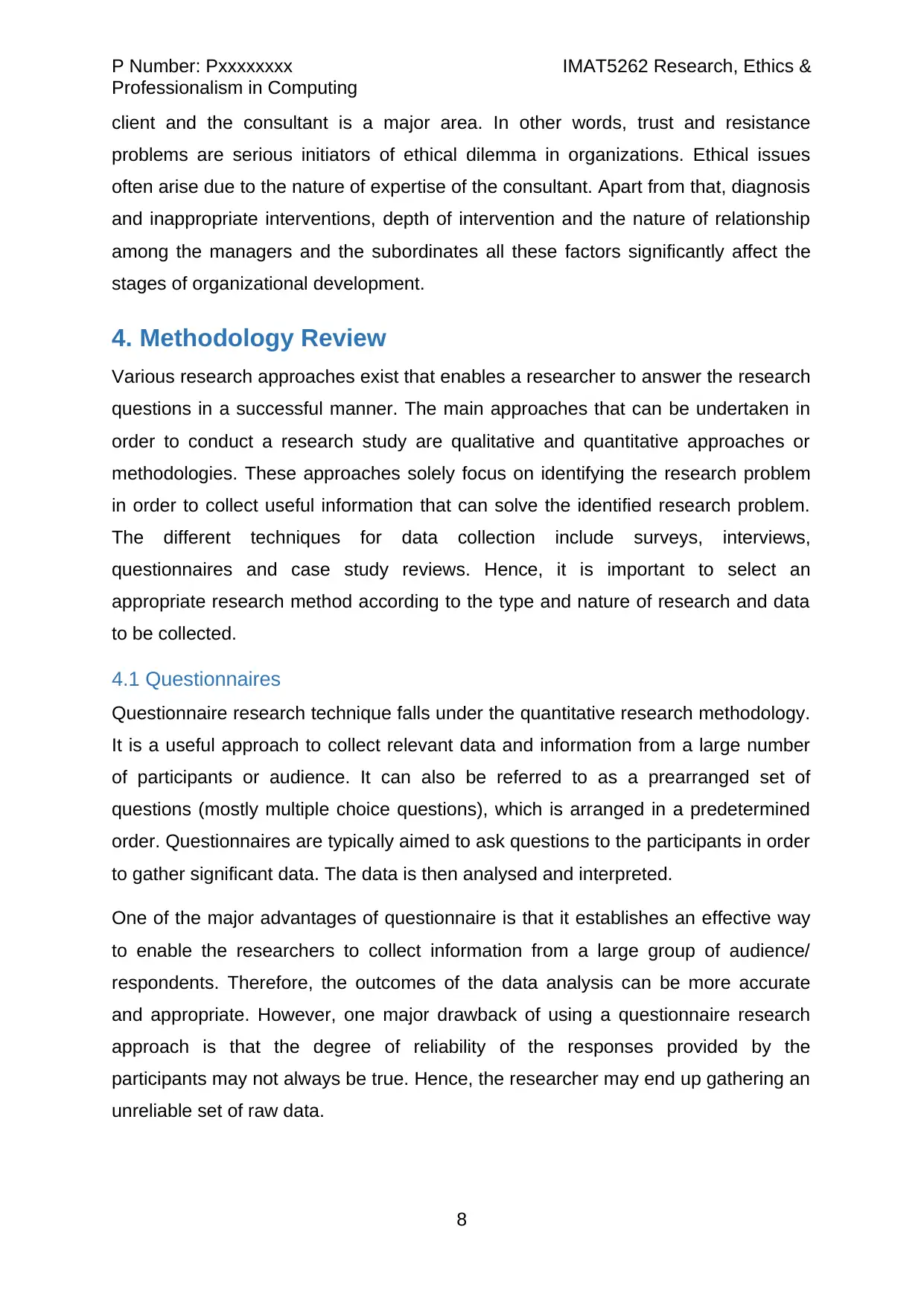
P Number: Pxxxxxxxx IMAT5262 Research, Ethics &
Professionalism in Computing
client and the consultant is a major area. In other words, trust and resistance
problems are serious initiators of ethical dilemma in organizations. Ethical issues
often arise due to the nature of expertise of the consultant. Apart from that, diagnosis
and inappropriate interventions, depth of intervention and the nature of relationship
among the managers and the subordinates all these factors significantly affect the
stages of organizational development.
4. Methodology Review
Various research approaches exist that enables a researcher to answer the research
questions in a successful manner. The main approaches that can be undertaken in
order to conduct a research study are qualitative and quantitative approaches or
methodologies. These approaches solely focus on identifying the research problem
in order to collect useful information that can solve the identified research problem.
The different techniques for data collection include surveys, interviews,
questionnaires and case study reviews. Hence, it is important to select an
appropriate research method according to the type and nature of research and data
to be collected.
4.1 Questionnaires
Questionnaire research technique falls under the quantitative research methodology.
It is a useful approach to collect relevant data and information from a large number
of participants or audience. It can also be referred to as a prearranged set of
questions (mostly multiple choice questions), which is arranged in a predetermined
order. Questionnaires are typically aimed to ask questions to the participants in order
to gather significant data. The data is then analysed and interpreted.
One of the major advantages of questionnaire is that it establishes an effective way
to enable the researchers to collect information from a large group of audience/
respondents. Therefore, the outcomes of the data analysis can be more accurate
and appropriate. However, one major drawback of using a questionnaire research
approach is that the degree of reliability of the responses provided by the
participants may not always be true. Hence, the researcher may end up gathering an
unreliable set of raw data.
8
Professionalism in Computing
client and the consultant is a major area. In other words, trust and resistance
problems are serious initiators of ethical dilemma in organizations. Ethical issues
often arise due to the nature of expertise of the consultant. Apart from that, diagnosis
and inappropriate interventions, depth of intervention and the nature of relationship
among the managers and the subordinates all these factors significantly affect the
stages of organizational development.
4. Methodology Review
Various research approaches exist that enables a researcher to answer the research
questions in a successful manner. The main approaches that can be undertaken in
order to conduct a research study are qualitative and quantitative approaches or
methodologies. These approaches solely focus on identifying the research problem
in order to collect useful information that can solve the identified research problem.
The different techniques for data collection include surveys, interviews,
questionnaires and case study reviews. Hence, it is important to select an
appropriate research method according to the type and nature of research and data
to be collected.
4.1 Questionnaires
Questionnaire research technique falls under the quantitative research methodology.
It is a useful approach to collect relevant data and information from a large number
of participants or audience. It can also be referred to as a prearranged set of
questions (mostly multiple choice questions), which is arranged in a predetermined
order. Questionnaires are typically aimed to ask questions to the participants in order
to gather significant data. The data is then analysed and interpreted.
One of the major advantages of questionnaire is that it establishes an effective way
to enable the researchers to collect information from a large group of audience/
respondents. Therefore, the outcomes of the data analysis can be more accurate
and appropriate. However, one major drawback of using a questionnaire research
approach is that the degree of reliability of the responses provided by the
participants may not always be true. Hence, the researcher may end up gathering an
unreliable set of raw data.
8
⊘ This is a preview!⊘
Do you want full access?
Subscribe today to unlock all pages.

Trusted by 1+ million students worldwide
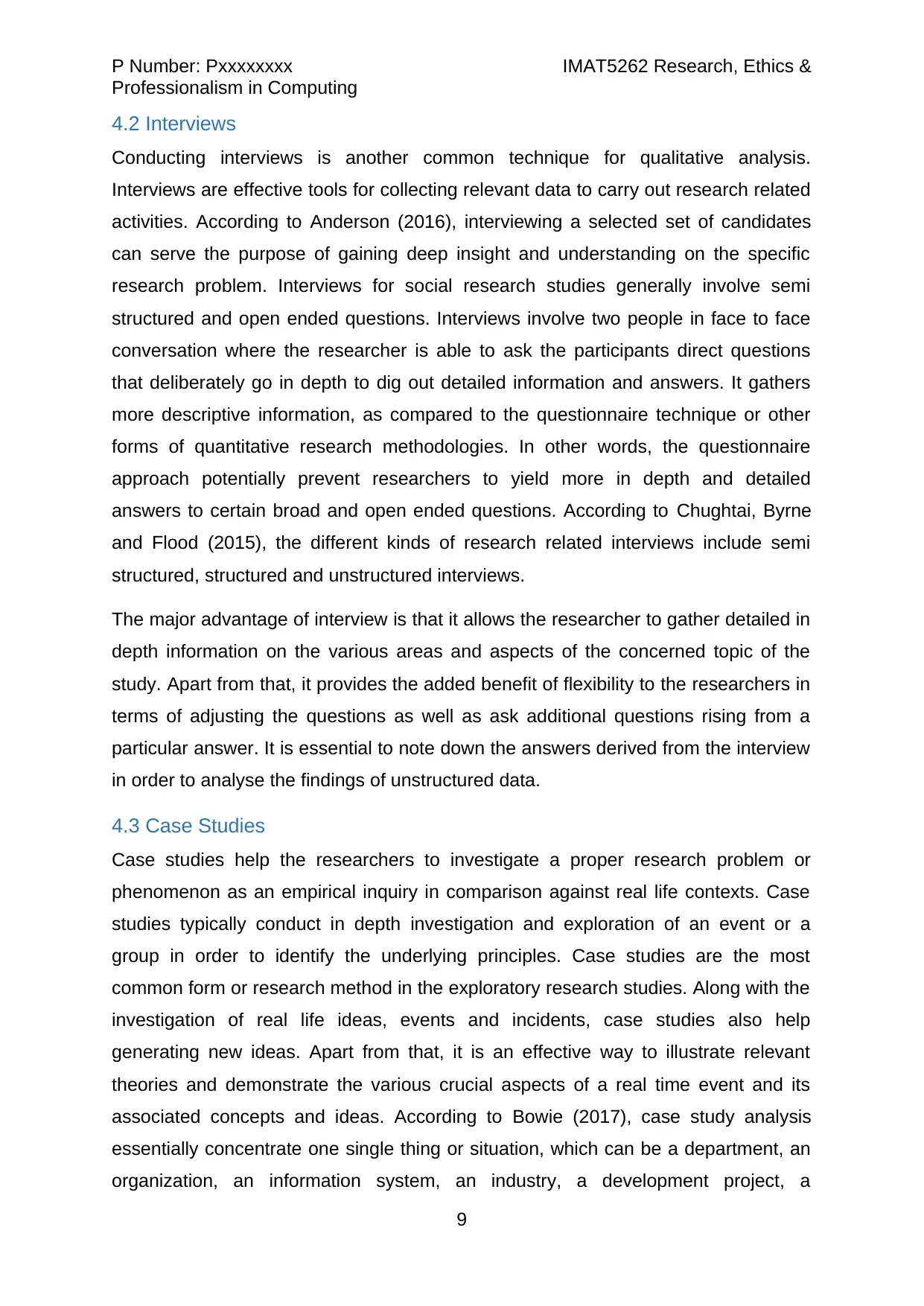
P Number: Pxxxxxxxx IMAT5262 Research, Ethics &
Professionalism in Computing
4.2 Interviews
Conducting interviews is another common technique for qualitative analysis.
Interviews are effective tools for collecting relevant data to carry out research related
activities. According to Anderson (2016), interviewing a selected set of candidates
can serve the purpose of gaining deep insight and understanding on the specific
research problem. Interviews for social research studies generally involve semi
structured and open ended questions. Interviews involve two people in face to face
conversation where the researcher is able to ask the participants direct questions
that deliberately go in depth to dig out detailed information and answers. It gathers
more descriptive information, as compared to the questionnaire technique or other
forms of quantitative research methodologies. In other words, the questionnaire
approach potentially prevent researchers to yield more in depth and detailed
answers to certain broad and open ended questions. According to Chughtai, Byrne
and Flood (2015), the different kinds of research related interviews include semi
structured, structured and unstructured interviews.
The major advantage of interview is that it allows the researcher to gather detailed in
depth information on the various areas and aspects of the concerned topic of the
study. Apart from that, it provides the added benefit of flexibility to the researchers in
terms of adjusting the questions as well as ask additional questions rising from a
particular answer. It is essential to note down the answers derived from the interview
in order to analyse the findings of unstructured data.
4.3 Case Studies
Case studies help the researchers to investigate a proper research problem or
phenomenon as an empirical inquiry in comparison against real life contexts. Case
studies typically conduct in depth investigation and exploration of an event or a
group in order to identify the underlying principles. Case studies are the most
common form or research method in the exploratory research studies. Along with the
investigation of real life ideas, events and incidents, case studies also help
generating new ideas. Apart from that, it is an effective way to illustrate relevant
theories and demonstrate the various crucial aspects of a real time event and its
associated concepts and ideas. According to Bowie (2017), case study analysis
essentially concentrate one single thing or situation, which can be a department, an
organization, an information system, an industry, a development project, a
9
Professionalism in Computing
4.2 Interviews
Conducting interviews is another common technique for qualitative analysis.
Interviews are effective tools for collecting relevant data to carry out research related
activities. According to Anderson (2016), interviewing a selected set of candidates
can serve the purpose of gaining deep insight and understanding on the specific
research problem. Interviews for social research studies generally involve semi
structured and open ended questions. Interviews involve two people in face to face
conversation where the researcher is able to ask the participants direct questions
that deliberately go in depth to dig out detailed information and answers. It gathers
more descriptive information, as compared to the questionnaire technique or other
forms of quantitative research methodologies. In other words, the questionnaire
approach potentially prevent researchers to yield more in depth and detailed
answers to certain broad and open ended questions. According to Chughtai, Byrne
and Flood (2015), the different kinds of research related interviews include semi
structured, structured and unstructured interviews.
The major advantage of interview is that it allows the researcher to gather detailed in
depth information on the various areas and aspects of the concerned topic of the
study. Apart from that, it provides the added benefit of flexibility to the researchers in
terms of adjusting the questions as well as ask additional questions rising from a
particular answer. It is essential to note down the answers derived from the interview
in order to analyse the findings of unstructured data.
4.3 Case Studies
Case studies help the researchers to investigate a proper research problem or
phenomenon as an empirical inquiry in comparison against real life contexts. Case
studies typically conduct in depth investigation and exploration of an event or a
group in order to identify the underlying principles. Case studies are the most
common form or research method in the exploratory research studies. Along with the
investigation of real life ideas, events and incidents, case studies also help
generating new ideas. Apart from that, it is an effective way to illustrate relevant
theories and demonstrate the various crucial aspects of a real time event and its
associated concepts and ideas. According to Bowie (2017), case study analysis
essentially concentrate one single thing or situation, which can be a department, an
organization, an information system, an industry, a development project, a
9
Paraphrase This Document
Need a fresh take? Get an instant paraphrase of this document with our AI Paraphraser
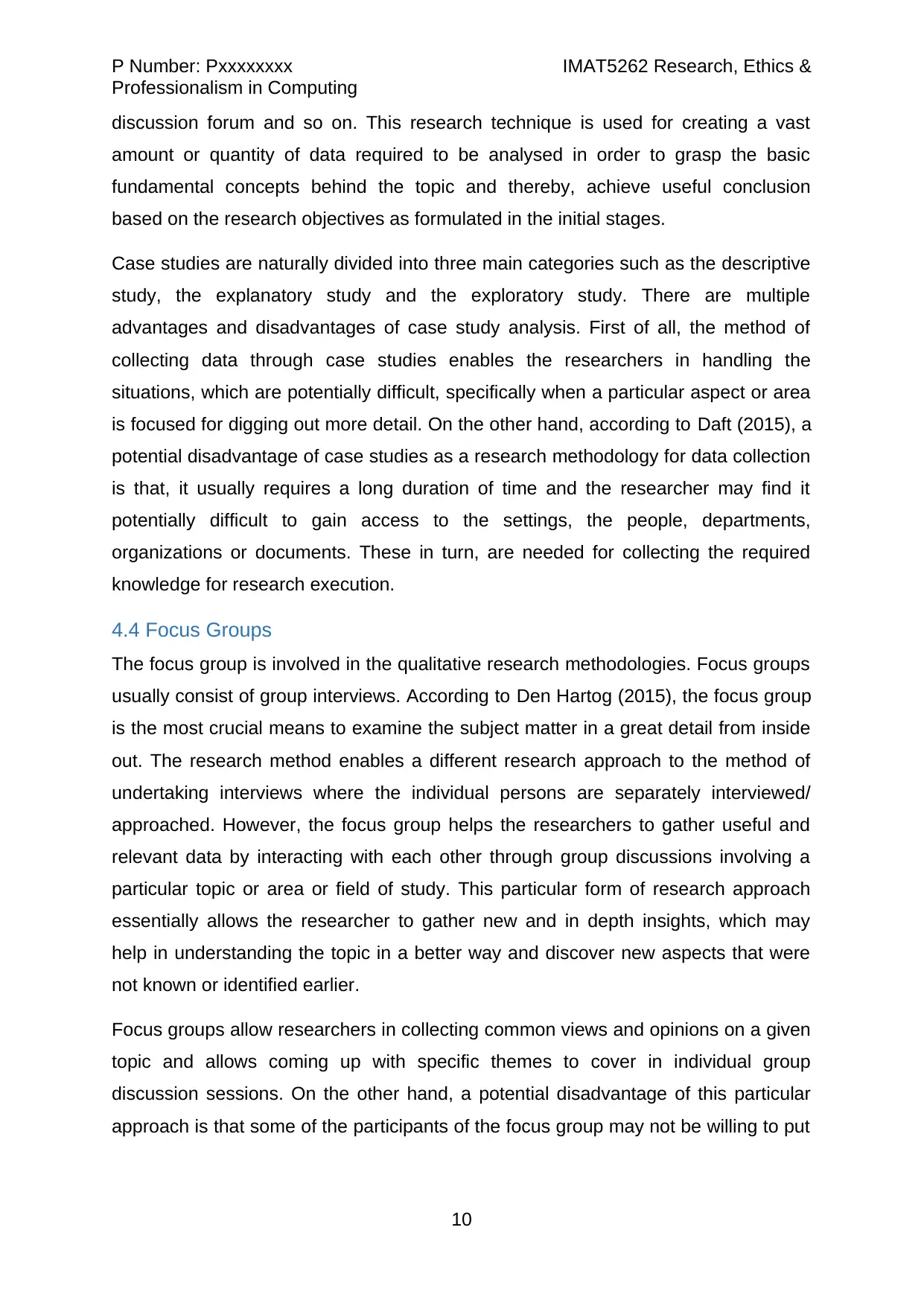
P Number: Pxxxxxxxx IMAT5262 Research, Ethics &
Professionalism in Computing
discussion forum and so on. This research technique is used for creating a vast
amount or quantity of data required to be analysed in order to grasp the basic
fundamental concepts behind the topic and thereby, achieve useful conclusion
based on the research objectives as formulated in the initial stages.
Case studies are naturally divided into three main categories such as the descriptive
study, the explanatory study and the exploratory study. There are multiple
advantages and disadvantages of case study analysis. First of all, the method of
collecting data through case studies enables the researchers in handling the
situations, which are potentially difficult, specifically when a particular aspect or area
is focused for digging out more detail. On the other hand, according to Daft (2015), a
potential disadvantage of case studies as a research methodology for data collection
is that, it usually requires a long duration of time and the researcher may find it
potentially difficult to gain access to the settings, the people, departments,
organizations or documents. These in turn, are needed for collecting the required
knowledge for research execution.
4.4 Focus Groups
The focus group is involved in the qualitative research methodologies. Focus groups
usually consist of group interviews. According to Den Hartog (2015), the focus group
is the most crucial means to examine the subject matter in a great detail from inside
out. The research method enables a different research approach to the method of
undertaking interviews where the individual persons are separately interviewed/
approached. However, the focus group helps the researchers to gather useful and
relevant data by interacting with each other through group discussions involving a
particular topic or area or field of study. This particular form of research approach
essentially allows the researcher to gather new and in depth insights, which may
help in understanding the topic in a better way and discover new aspects that were
not known or identified earlier.
Focus groups allow researchers in collecting common views and opinions on a given
topic and allows coming up with specific themes to cover in individual group
discussion sessions. On the other hand, a potential disadvantage of this particular
approach is that some of the participants of the focus group may not be willing to put
10
Professionalism in Computing
discussion forum and so on. This research technique is used for creating a vast
amount or quantity of data required to be analysed in order to grasp the basic
fundamental concepts behind the topic and thereby, achieve useful conclusion
based on the research objectives as formulated in the initial stages.
Case studies are naturally divided into three main categories such as the descriptive
study, the explanatory study and the exploratory study. There are multiple
advantages and disadvantages of case study analysis. First of all, the method of
collecting data through case studies enables the researchers in handling the
situations, which are potentially difficult, specifically when a particular aspect or area
is focused for digging out more detail. On the other hand, according to Daft (2015), a
potential disadvantage of case studies as a research methodology for data collection
is that, it usually requires a long duration of time and the researcher may find it
potentially difficult to gain access to the settings, the people, departments,
organizations or documents. These in turn, are needed for collecting the required
knowledge for research execution.
4.4 Focus Groups
The focus group is involved in the qualitative research methodologies. Focus groups
usually consist of group interviews. According to Den Hartog (2015), the focus group
is the most crucial means to examine the subject matter in a great detail from inside
out. The research method enables a different research approach to the method of
undertaking interviews where the individual persons are separately interviewed/
approached. However, the focus group helps the researchers to gather useful and
relevant data by interacting with each other through group discussions involving a
particular topic or area or field of study. This particular form of research approach
essentially allows the researcher to gather new and in depth insights, which may
help in understanding the topic in a better way and discover new aspects that were
not known or identified earlier.
Focus groups allow researchers in collecting common views and opinions on a given
topic and allows coming up with specific themes to cover in individual group
discussion sessions. On the other hand, a potential disadvantage of this particular
approach is that some of the participants of the focus group may not be willing to put
10
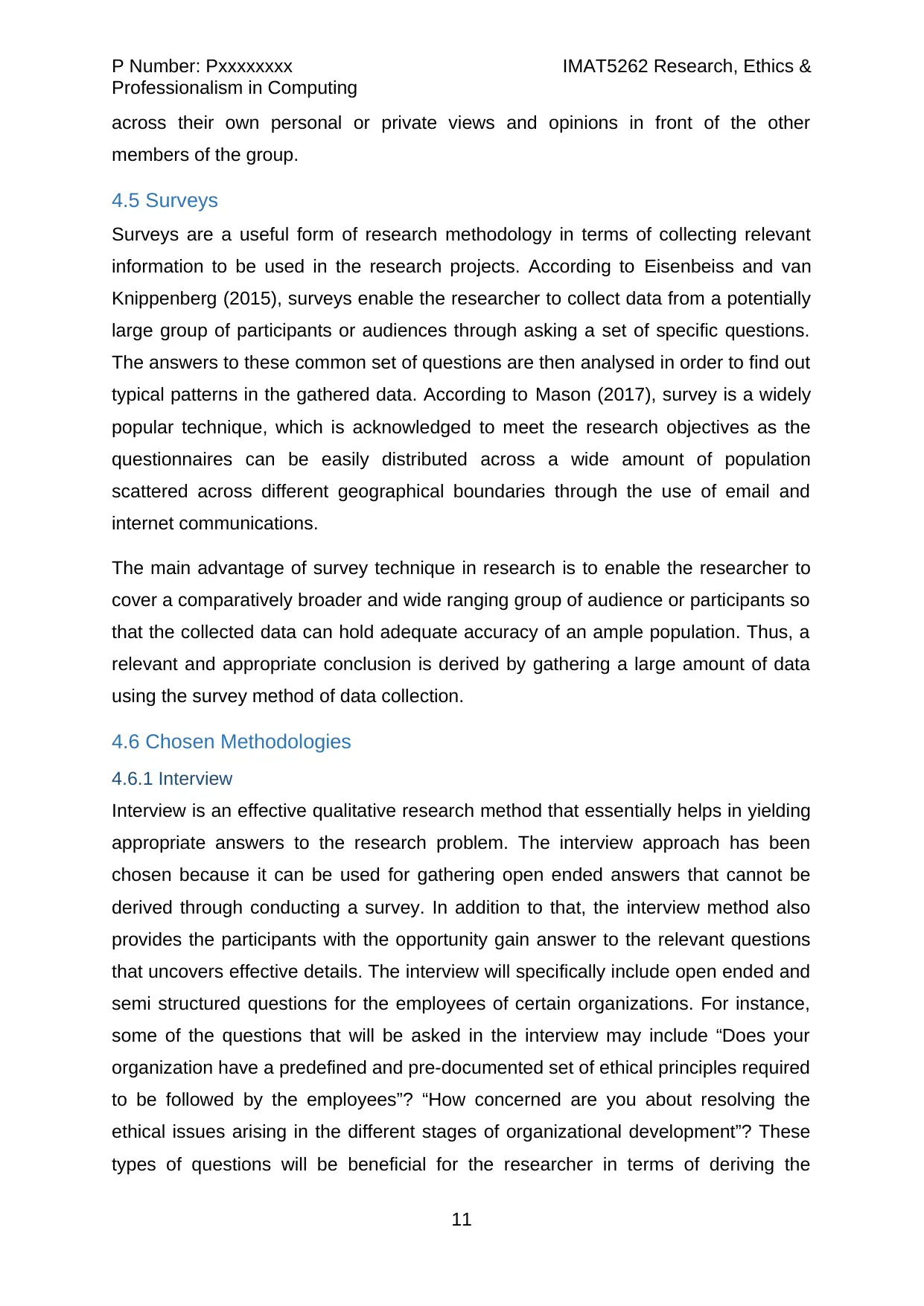
P Number: Pxxxxxxxx IMAT5262 Research, Ethics &
Professionalism in Computing
across their own personal or private views and opinions in front of the other
members of the group.
4.5 Surveys
Surveys are a useful form of research methodology in terms of collecting relevant
information to be used in the research projects. According to Eisenbeiss and van
Knippenberg (2015), surveys enable the researcher to collect data from a potentially
large group of participants or audiences through asking a set of specific questions.
The answers to these common set of questions are then analysed in order to find out
typical patterns in the gathered data. According to Mason (2017), survey is a widely
popular technique, which is acknowledged to meet the research objectives as the
questionnaires can be easily distributed across a wide amount of population
scattered across different geographical boundaries through the use of email and
internet communications.
The main advantage of survey technique in research is to enable the researcher to
cover a comparatively broader and wide ranging group of audience or participants so
that the collected data can hold adequate accuracy of an ample population. Thus, a
relevant and appropriate conclusion is derived by gathering a large amount of data
using the survey method of data collection.
4.6 Chosen Methodologies
4.6.1 Interview
Interview is an effective qualitative research method that essentially helps in yielding
appropriate answers to the research problem. The interview approach has been
chosen because it can be used for gathering open ended answers that cannot be
derived through conducting a survey. In addition to that, the interview method also
provides the participants with the opportunity gain answer to the relevant questions
that uncovers effective details. The interview will specifically include open ended and
semi structured questions for the employees of certain organizations. For instance,
some of the questions that will be asked in the interview may include “Does your
organization have a predefined and pre-documented set of ethical principles required
to be followed by the employees”? “How concerned are you about resolving the
ethical issues arising in the different stages of organizational development”? These
types of questions will be beneficial for the researcher in terms of deriving the
11
Professionalism in Computing
across their own personal or private views and opinions in front of the other
members of the group.
4.5 Surveys
Surveys are a useful form of research methodology in terms of collecting relevant
information to be used in the research projects. According to Eisenbeiss and van
Knippenberg (2015), surveys enable the researcher to collect data from a potentially
large group of participants or audiences through asking a set of specific questions.
The answers to these common set of questions are then analysed in order to find out
typical patterns in the gathered data. According to Mason (2017), survey is a widely
popular technique, which is acknowledged to meet the research objectives as the
questionnaires can be easily distributed across a wide amount of population
scattered across different geographical boundaries through the use of email and
internet communications.
The main advantage of survey technique in research is to enable the researcher to
cover a comparatively broader and wide ranging group of audience or participants so
that the collected data can hold adequate accuracy of an ample population. Thus, a
relevant and appropriate conclusion is derived by gathering a large amount of data
using the survey method of data collection.
4.6 Chosen Methodologies
4.6.1 Interview
Interview is an effective qualitative research method that essentially helps in yielding
appropriate answers to the research problem. The interview approach has been
chosen because it can be used for gathering open ended answers that cannot be
derived through conducting a survey. In addition to that, the interview method also
provides the participants with the opportunity gain answer to the relevant questions
that uncovers effective details. The interview will specifically include open ended and
semi structured questions for the employees of certain organizations. For instance,
some of the questions that will be asked in the interview may include “Does your
organization have a predefined and pre-documented set of ethical principles required
to be followed by the employees”? “How concerned are you about resolving the
ethical issues arising in the different stages of organizational development”? These
types of questions will be beneficial for the researcher in terms of deriving the
11
⊘ This is a preview!⊘
Do you want full access?
Subscribe today to unlock all pages.

Trusted by 1+ million students worldwide
1 out of 32
Related Documents
Your All-in-One AI-Powered Toolkit for Academic Success.
+13062052269
info@desklib.com
Available 24*7 on WhatsApp / Email
![[object Object]](/_next/static/media/star-bottom.7253800d.svg)
Unlock your academic potential
Copyright © 2020–2026 A2Z Services. All Rights Reserved. Developed and managed by ZUCOL.





